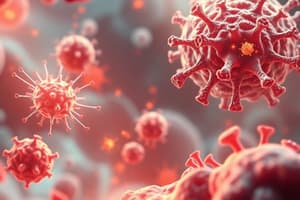Podcast
Questions and Answers
What characterizes Tumor-Specific Antigens (TSAs)?
What characterizes Tumor-Specific Antigens (TSAs)?
- They are unique to tumor cells and arise from mutations. (correct)
- They trigger an immune response only in healthy tissue.
- They are found on both normal and tumor cells.
- They result from mutations in normal cells.
Which antigen is an example of an oncofetal antigen?
Which antigen is an example of an oncofetal antigen?
- Alpha-fetoprotein (AFP) (correct)
- Carcinoembryonic antigen (CEA)
- Viral antigens
- Neoantigens
How do tumor cells often evade immune detection?
How do tumor cells often evade immune detection?
- By enhancing the activity of T cells
- By downregulating antigen expression (correct)
- By increasing the expression of Tumor-Associated Antigens (TAAs)
- By producing more antibodies against tumor antigens
In therapeutic applications, what role do monoclonal antibodies serve?
In therapeutic applications, what role do monoclonal antibodies serve?
What is a key challenge that tumor cells face in relation to immune response?
What is a key challenge that tumor cells face in relation to immune response?
What defines a Tumor-Associated Antigen (TAA)?
What defines a Tumor-Associated Antigen (TAA)?
Which of the following is NOT a source of tumor antigens?
Which of the following is NOT a source of tumor antigens?
What is the primary role of dendritic cells in relation to tumor antigens?
What is the primary role of dendritic cells in relation to tumor antigens?
Flashcards are hidden until you start studying
Study Notes
Tumor Antigens
-
Definition: Tumor antigens are molecules expressed on the surface of tumor cells that can trigger an immune response.
-
Types of Tumor Antigens:
-
Tumor-Specific Antigens (TSAs):
- Unique to tumor cells, not found on normal cells.
- Result from mutations in tumor cells.
- Example: Neoantigens generated from mutated proteins.
-
Tumor-Associated Antigens (TAAs):
- Found in both tumor cells and normal cells but overexpressed in tumors.
- Can arise from proteins normally present in smaller amounts.
- Examples: Carcinoembryonic antigen (CEA), alpha-fetoprotein (AFP).
-
-
Sources of Tumor Antigens:
- Mutated Proteins: Altered forms of normal proteins due to genetic mutations.
- Oncofetal Antigens: Proteins normally expressed during fetal development but re-expressed in tumors.
- Viral Antigens: Antigens derived from viruses that cause cancers (e.g., HPV in cervical cancer).
-
Role in Immune Response:
- Tumor antigens can be recognized by T cells, leading to tumor cell destruction.
- Dendritic cells present antigens to T cells, facilitating activation and proliferation.
- Antibodies can also target tumor antigens, marking cells for destruction by the immune system.
-
Challenges:
- Tumor cells can develop mechanisms to evade immune detection (e.g., downregulation of antigen expression).
- Immune tolerance can occur, where the immune system fails to target cells expressing TAAs.
-
Therapeutic Applications:
- Cancer Vaccines: Designed to elicit an immune response against specific tumor antigens.
- Monoclonal Antibodies: Target specific tumor antigens for immune-mediated destruction.
- Checkpoint Inhibitors: Enhance the immune response against tumor antigens by blocking inhibitory signals on T cells.
-
Research Directions:
- Identification of new tumor antigens through genomic and proteomic technologies.
- Development of personalized cancer vaccines based on individual tumor antigen profiles.
- Exploration of combination therapies to improve efficacy against tumor antigens.
Tumor Antigens Overview
- Tumor antigens are molecules on tumor cell surfaces that trigger immune responses.
Types of Tumor Antigens
-
Tumor-Specific Antigens (TSAs):
- Unique to tumor cells, absent in normal cells.
- Result from genetic mutations in cancer cells.
- Example: Neoantigens formed from altered proteins due to mutations.
-
Tumor-Associated Antigens (TAAs):
- Present in both tumor and normal cells but overexpressed in tumors.
- Arise from proteins typically found in lesser amounts.
- Examples include Carcinoembryonic antigen (CEA) and alpha-fetoprotein (AFP).
Sources of Tumor Antigens
- Mutated Proteins: Altered normal proteins arising from genetic mutations.
- Oncofetal Antigens: Proteins usually expressed during fetal development but reactivated in tumors.
- Viral Antigens: Antigens from viruses linked to cancers, like Human Papillomavirus (HPV) in cervical cancer.
Role in Immune Response
- Tumor antigens are recognized by T cells, facilitating destruction of tumor cells.
- Dendritic cells present these antigens to T cells, promoting activation and proliferation.
- Antibodies can specifically target tumor antigens, marking them for immune system destruction.
Challenges in Tumor Immunology
- Tumor cells may evade immune detection through downregulating antigen expression.
- Immune tolerance can occur, preventing the immune system from targeting cells expressing TAAs.
Therapeutic Applications
- Cancer Vaccines: Aim to initiate an immune response against specific tumor antigens.
- Monoclonal Antibodies: Designed to selectively target tumor antigens for immune destruction.
- Checkpoint Inhibitors: Enhance immune responses by blocking inhibitory signals that dampen T cell activity.
Research Directions
- Ongoing identification of new tumor antigens via genomic and proteomic analysis.
- Development of personalized cancer vaccines tailored to individual tumor antigen profiles.
- Exploration of combination therapies to enhance effectiveness against tumor antigens.
Studying That Suits You
Use AI to generate personalized quizzes and flashcards to suit your learning preferences.




